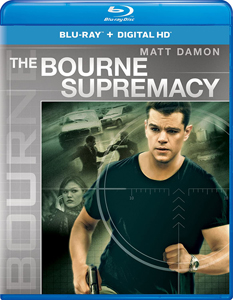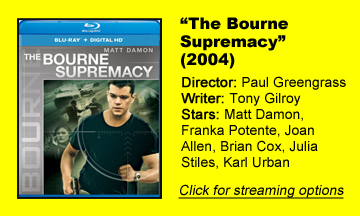From Jan. 6-14, we’re looking back at the five films of the “Bourne” series, so prepare to have your memory refreshed. Next up is the second film, “The Bourne Supremacy” (2004):
Now things get serious
After the premise of amnesiac ex-assassin Jason Bourne (Matt Damon) was laid down in “The Bourne Identity” (2002), “The Bourne Supremacy” has a “now things get serious” feel. It’s still an intensely watchable movie, but I like the filmmaking style less. Director Paul Greengrass, editors Richard Pearson and Christopher Rouse and composer John Powell craft a jittery action-suspenser.
The climactic car chase through city streets and tunnels pits Jason against a Russian bounty hunter (Karl Urban) who might as well be like the action-movie version of “Halloween’s” The Shape, as his only purpose is to kill Bourne. It’s technically bigger, and to some tastes it might be better than the chase in director Doug Liman’s “The Bourne Identity.”
But it’s cut together in such rapid sequence, and the camera is so shaky within each cut, that I couldn’t even tell the difference between Damon and Urban, let alone their vehicles.
Tony Gilroy – working from Robert Ludlum’s 1986 novel – crafts a screenplay with two main branches. One finds Urban’s bounty hunter accidentally taking out Bourne’s girlfriend Marie (Franka Potente) before pursuing Bourne around the globe; we don’t find out for quite a while who he’s working for.
The second more coherent and gripping plot is like a softer version of “The Fugitive.” Joan Allen’s Pamela Landy is as much of a main character as Bourne. She’s a CIA agent who is looking into the supposedly defunct secret government agency Treadstone, which we viewers know is/was led by Ward Abbott (Brian Cox).
The first film was simpler, but it also allowed us to think Abbott might have good reasons for his shiftiness. So it’s a little disappointing that he’s basically trying to bump off Bourne to cover his own corruption.
A colder performance
While Bourne structurally functions as the good guy, Damon gives an appropriately colder performance here. For one, Jason’s girlfriend has been murdered and he’s been rousted from his fairly nice off-the-grid life in India, where they somehow have a nice beachfront home.
For another – and this is “Supremacy’s” thematic thrust – Bourne’s memory is returning in little snippets: He’s remembering not only the fact that he was an assassin but also a specific mission.
Repeatedly, we hear dialog from Chris Cooper’s Conklin – killed off in “Identity” – congratulating Bourne on his first assassination mission. It’s accompanied by a vision of a Berlin sign in Jason’s mind’s eye. It’s frustrating – appropriately, I suppose — that Bourne’s brain spins its wheels in trying to remember this mission, considering that the rest of the narrative is relentlessly propulsive.
If you’re feeling sinister
I’m of two minds as to whether Bourne’s situation makes logical sense. He was an assassin, he got amnesia, and now that he remembers he was an assassin, his moral outlook on the job has changed. That seems like a dime-store thriller novel conceit rather than real science.

But on the other hand – through dialog from Treadstone agent Nicky (Julia Stiles, again underused considering she has headlined her own big movies) – we are again reminded (as with Clive Owen’s dialog in the first movie) that there’s something more sinister going on, something along the lines of Treadstone programming people to be assassins.
If I’m reading that right, then Bourne’s amnesia has knocked out his programming and his true morality has re-emerged. A fuller explanation is needed in a future film, but this could be juicy stuff. Or it could be exactly what I think it is.
Traveling the world
Like the first film, “The Bourne Supremacy” looks great; India, Moscow and Berlin are showcased under Oliver Wood’s lens. But much more happens at nighttime in this entry, adding to the impression that this one is less transparent with the viewer than the original.
One particularly good sequence finds Bourne escaping Landy’s agents on foot through a series of clever moves through a big city. On the other hand, there’s an entire sequence of Bourne securing, interviewing and fighting a person where I had no idea who the person is or how Bourne knew where to find him.
If you need to take a breath, hit the pause button, because Greengrass will outpace you. Perhaps we’ll need to get used to it, because he also directs two of the remaining three entries.


